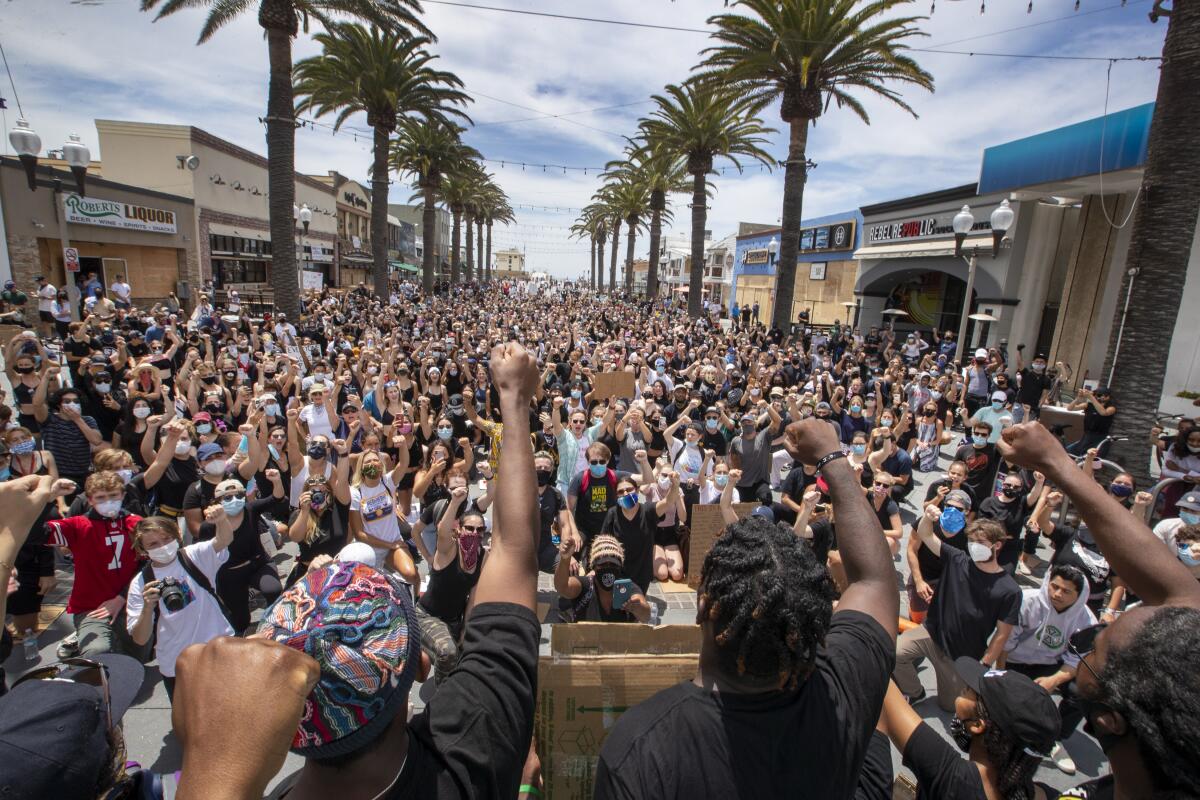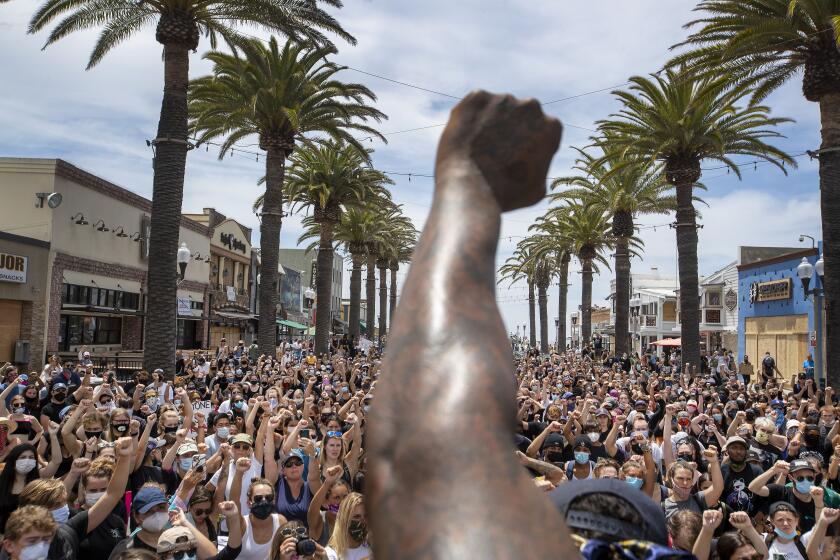Commentary: I fought for Black studies at UCLA. The College Board just erased U.S. history

- Share via
There is a fine line between government oversight and government overreach, and Florida Gov. Ron DeSantis erased it.
Shortly after being sworn in for a second term, DeSantis declared that the state would ban the College Board’s newly designed African American studies Advanced Placement course for high school students. In defense of his position, the governor argued that issues covered in the course, such as critical thinking about race and contemporary movements to abolish prisons, were part of a “political agenda” that is “on the wrong side of the line for Florida standards.”
DeSantis further challenged the relevance and educational benefits of the subject, adding: “We believe in teaching kids facts and how to think, but we don’t believe they should have an agenda imposed on them. When you try to use Black history to shoehorn in queer theory, you are clearly trying to use that for political purposes.”
In response, the College Board capitulated, excising whole swaths of contemporary Black history, research and scholarship. Of the topics removed: the Movement for Black Lives; the advent of #BlackLivesMatter; reparations; the unprecedented uprisings following the murders of George Floyd and Breonna Taylor; Black LGBTQ history; and a host of issues affecting the Black community after 1985.
On the first day of Black History month and after right-wing complaints, the College Board issues a watered-down Black studies curriculum. So much the worse for students.
Florida’s planned ban has effectively upended the College Board’s act of contrition and social repair. AP African American studies was meant to be the product of their efforts to advance institutional equity and inclusion. Now it has excised what amounts to my entire lifetime from the historical understanding of the Black experience — a devastating confirmation that, contrary to DeSantis’ definition, the battle to teach truth and facts is all uphill.
America is foremost a story. The existence and horrors of legalized slavery are tantamount to the story of America. The Civil War happened because of it, and the current fight for equity across a vast array of institutions and industries reflects slavery’s lasting impact on our society. Systematic enslavement required systemic racism. And though Abraham Lincoln abolished slavery 160 years ago, systemic racism still imbues every aspect of society. We cannot determine how best to solve many of our nation’s most pressing problems without knowing how it evolved and how our leaders and thinkers — now-excluded voices such as Nikki Giovanni, June Jordan, Ta-Nehisi Coates, Kimberlé Crenshaw and bell hooks — have fought to loosen its hold.
The sacred educational purpose of African American studies is to provide a learning environment that explores how the wins and losses against systemic racism inform our present condition. Students deserve and need to know that they are a part of a long struggle for freedom, equality and inclusion.
Walter Mosley, Luis Rodriguez, the coiner of #BlackLivesMatter and others sketch a hopeful future for L.A. and the U.S. after George Floyd protests.
African American studies is no stranger to attacks, which emerge from political expediency and rely on mischaracterizations of its curricular importance. These programs are constantly pilloried — from accusations that Black studies lacks academic rigor to efforts to shrug it off as an elective.
As a graduate and professor of African American studies, I am all too familiar with the many battles. The history of our fight for curricular inclusion is rife with starts and stalls. The students in my course learn that Black studies emerged from post-civil rights student activism. They also learn that some, such as UCLA students Bunchy Carter and John Huggins, were killed in this struggle. Many of my students confess they were unaware of this history and the broader quest to departmentalize African American studies.
At many of the nation’s top schools, colleges and universities, these programs are an underfunded workhorse, among the few places where students learn of the Black American experience and contributions to the betterment of society. And just as often, they are the only place students can find and learn from Black instructors. As a result, any limits placed on African American studies are a bellwether for a campus’ climate, a barometer of its true level of diversity and inclusion.
Conservatives vilify school librarians as “groomers and pedophiles” for stocking LGBTQ and racially themed books. “We have been cursed,” said one librarian.
To limit one’s history is to limit one’s humanity. The most egregious human violations, slavery and genocide, reside within these limits. Suppose we are to achieve a genuinely equitable curriculum or society. In that case, we need educational tools like African American studies to bridge the knowledge gap. Because — it bears repeating — the African American story is also the American story. Happy Black History Month.
Hunter is a professor of sociology and the inaugural chair of African American studies at UCLA. He is the coiner of #BlackLivesMatter, and author of four books, including the forthcoming “Radical Reparations.”
More to Read
Sign up for our Book Club newsletter
Get the latest news, events and more from the Los Angeles Times Book Club, and help us get L.A. reading and talking.
You may occasionally receive promotional content from the Los Angeles Times.











